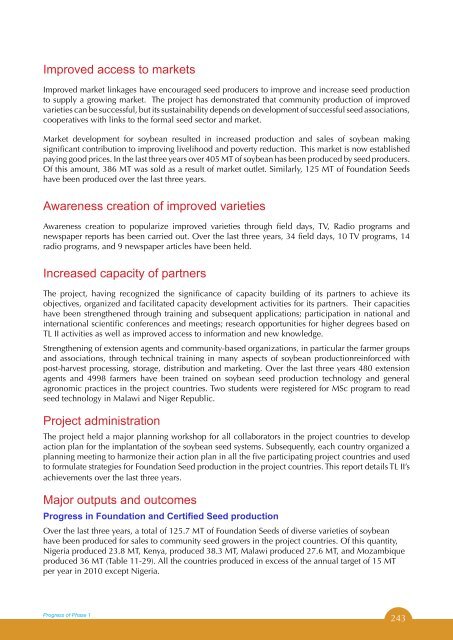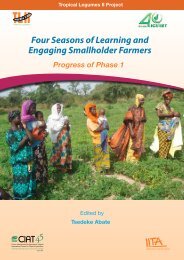Four Seasons of Learning and Engaging Smallholder Farmers - icrisat
Four Seasons of Learning and Engaging Smallholder Farmers - icrisat
Four Seasons of Learning and Engaging Smallholder Farmers - icrisat
You also want an ePaper? Increase the reach of your titles
YUMPU automatically turns print PDFs into web optimized ePapers that Google loves.
Improved access to markets<br />
Improved market linkages have encouraged seed producers to improve <strong>and</strong> increase seed production<br />
to supply a growing market. The project has demonstrated that community production <strong>of</strong> improved<br />
varieties can be successful, but its sustainability depends on development <strong>of</strong> successful seed associations,<br />
cooperatives with links to the formal seed sector <strong>and</strong> market.<br />
Market development for soybean resulted in increased production <strong>and</strong> sales <strong>of</strong> soybean making<br />
significant contribution to improving livelihood <strong>and</strong> poverty reduction. This market is now established<br />
paying good prices. In the last three years over 405 MT <strong>of</strong> soybean has been produced by seed producers.<br />
Of this amount, 386 MT was sold as a result <strong>of</strong> market outlet. Similarly, 125 MT <strong>of</strong> Foundation Seeds<br />
have been produced over the last three years.<br />
Awareness creation <strong>of</strong> improved varieties<br />
Awareness creation to popularize improved varieties through field days, TV, Radio programs <strong>and</strong><br />
newspaper reports has been carried out. Over the last three years, 34 field days, 10 TV programs, 14<br />
radio programs, <strong>and</strong> 9 newspaper articles have been held.<br />
Increased capacity <strong>of</strong> partners<br />
The project, having recognized the significance <strong>of</strong> capacity building <strong>of</strong> its partners to achieve its<br />
objectives, organized <strong>and</strong> facilitated capacity development activities for its partners. Their capacities<br />
have been strengthened through training <strong>and</strong> subsequent applications; participation in national <strong>and</strong><br />
international scientific conferences <strong>and</strong> meetings; research opportunities for higher degrees based on<br />
TL II activities as well as improved access to information <strong>and</strong> new knowledge.<br />
Strengthening <strong>of</strong> extension agents <strong>and</strong> community-based organizations, in particular the farmer groups<br />
<strong>and</strong> associations, through technical training in many aspects <strong>of</strong> soybean productionreinforced with<br />
post-harvest processing, storage, distribution <strong>and</strong> marketing. Over the last three years 480 extension<br />
agents <strong>and</strong> 4998 farmers have been trained on soybean seed production technology <strong>and</strong> general<br />
agronomic practices in the project countries. Two students were registered for MSc program to read<br />
seed technology in Malawi <strong>and</strong> Niger Republic.<br />
Project administration<br />
The project held a major planning workshop for all collaborators in the project countries to develop<br />
action plan for the implantation <strong>of</strong> the soybean seed systems. Subsequently, each country organized a<br />
planning meeting to harmonize their action plan in all the five participating project countries <strong>and</strong> used<br />
to formulate strategies for Foundation Seed production in the project countries. This report details TL II’s<br />
achievements over the last three years.<br />
Major outputs <strong>and</strong> outcomes<br />
Progress in Foundation <strong>and</strong> Certified Seed production<br />
Over the last three years, a total <strong>of</strong> 125.7 MT <strong>of</strong> Foundation Seeds <strong>of</strong> diverse varieties <strong>of</strong> soybean<br />
have been produced for sales to community seed growers in the project countries. Of this quantity,<br />
Nigeria produced 23.8 MT, Kenya, produced 38.3 MT, Malawi produced 27.6 MT, <strong>and</strong> Mozambique<br />
produced 36 MT (Table 11-29). All the countries produced in excess <strong>of</strong> the annual target <strong>of</strong> 15 MT<br />
per year in 2010 except Nigeria.<br />
Progress <strong>of</strong> Phase 1<br />
243

















